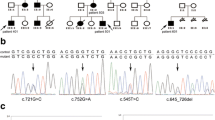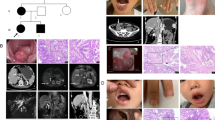Abstract
Background and Aims
Peutz–Jeghers syndrome (PJS) is an autosomal-dominant genetic disease caused by mutations in the tumor suppressor gene, STK11, which is characterized by gastrointestinal hamartomas, melanin spots on the lips and the extremities, and an increased risk of developing both gastrointestinal and extraintestinal malignancies.
Methods and Results
We treated a PJS patient without a positive family history, who possessed typical clinical manifestations including polyp canceration. In order to explore the genotype of this patient, blood samples were collected from all the available family members. The whole coding region and the flanking regions of the STK11 gene were amplified by polymerase chain reaction and analyzed by Sanger sequencing. Molecular analysis of the STK11 gene here revealed a 23-nucleotide deletion (c.426–448delCGTGCCGGAGAAGCGTTTCCCAG) in exon 3, resulting in a change of 13 codons and a truncating protein (p.S142SfsX13). This mutation was not found in normal individuals in this family including her parents or in 100 control individuals. Protein structure prediction indicated a dramatic loss of the kinase domain and complete loss of the C-terminal regulatory domain.
Conclusions
The results presented here enlarge the spectrum of STK11 mutation both disease-causing and malignancy-causing.


Similar content being viewed by others
Abbreviations
- AMPKα:
-
AMP-activated catalytic subunit alpha
- DBE:
-
Double-balloon enteroscopy
- dbSNP:
-
Database of single nucleotide polymorphisms
- GI:
-
Gastrointestinal
- HGMD:
-
Human Gene Mutation Database
- OMIM:
-
Online Mendelian Inheritance in Man
- PCR:
-
Polymerase chain reaction
- PJS:
-
Peutz–Jeghers syndrome
- STK11 :
-
Serine/threonine kinase 11
- STRADα/β:
-
STE20-related kinase adaptor alpha/beta
References
Giardiello FM, Brensinger JD, Tersmette AC, et al. Very high risk of cancer in familial Peutz–Jeghers syndrome. Gastroenterology. 2000;119:1447–1453.
Hearle N, Schumacher V, Menko FH, et al. Frequency and spectrum of cancers in the Peutz–Jeghers syndrome. Clin Cancer Res. 2006;12:3209–3215.
Giardiello FM, Trimbath JD. Peutz–Jeghers syndrome and management recommendations. Clin Gastroenterol Hepatol. 2006;4:408–415.
van Lier MG, Wagner A, Mathus-Vliegen EM, Kuipers EJ, Steyerberg EW, van Leerdam ME. High cancer risk in Peutz–Jeghers syndrome: a systematic review and surveillance recommendations. Am J Gastroenterol. 2010;105:1258–1264. (author reply 1265).
van Lier MG, Westerman AM, Wagner A, et al. High cancer risk and increased mortality in patients with Peutz–Jeghers syndrome. Gut. 2011;60:141–147.
Gao Y, Zhang FM, Huang S, et al. A De Novo mutation of STK11 gene in a Chinese patient with Peutz–Jeghers syndrome. Dig Dis Sci. 2010;55:1032–1036.
Peutz JL. Very remarkable case of familial polyposis of the mucous membrane of the intestinal tract and nasopharynx accompanied by peculiar pigmentation of the skin and mucous membrane. Ned Tijdschr Geneeskd. 1921;10:134–146.
Jeghers H, Mc KV, Katz KH. Generalized intestinal polyposis and melanin spots of the oral mucosa, lips and digits: a syndrome of diagnostic significance. N Engl J Med. 1949;241:993. (illust; passim).
Jenne DE, Reimann H, Nezu J, et al. Peutz–Jeghers syndrome is caused by mutations in a novel serine threonine kinase. Nat Genet. 1998;18:38–43.
Hemminki A, Tomlinson I, Markie D, et al. Localization of a susceptibility locus for Peutz–Jeghers syndrome to 19p using comparative genomic hybridization and targeted linkage analysis. Nat Genet. 1997;15:87–90.
Buchet-Poyau K, Mehenni H, Radhakrishna U, Antonarakis SE. Search for the second Peutz–Jeghers syndrome locus: exclusion of the STK13, PRKCG, KLK10, and PSCD2 genes on chromosome 19 and the STK11IP gene on chromosome 2. Cytogenet Genome Res. 2002;97:171–178.
Wang ZJ, Churchman M, Avizienyte E, et al. Germline mutations of the LKB1 (STK11) gene in Peutz–Jeghers patients. J Med Genet. 1999;36:365–368.
Giardiello FM, Welsh SB, Hamilton SR, et al. Increased risk of cancer in the Peutz–Jeghers syndrome. N Engl J Med. 1987;316:1511–1514.
Biasini M, Bienert S, Waterhouse A, et al. SWISS-MODEL: modelling protein tertiary and quaternary structure using evolutionary information. Nucleic Acids Res. 2014;42:W252–W258.
Hanks SK, Quinn AM, Hunter T. The protein kinase family: conserved features and deduced phylogeny of the catalytic domains. Science. 1988;241:42–52.
Stenson PD, Mort M, Ball EV, et al. The Human Gene Mutation Database: towards a comprehensive repository of inherited mutation data for medical research, genetic diagnosis and next-generation sequencing studies. Hum Genet. 2017;136:665–677.
Boudeau J, Baas AF, Deak M, et al. MO25alpha/beta interact with STRADalpha/beta enhancing their ability to bind, activate and localize LKB1 in the cytoplasm. EMBO J. 2003;22:5102–5114.
Korsse SE, Peppelenbosch MP, van Veelen W. Targeting LKB1 signaling in cancer. Biochem Biophys Acta. 2013;1835:194–210.
Forcet C, Etienne-Manneville S, Gaude H, et al. Functional analysis of Peutz–Jeghers mutations reveals that the LKB1 C-terminal region exerts a crucial role in regulating both the AMPK pathway and the cell polarity. Hum Mol Genet. 2005;14:1283–1292.
Baas AF, Kuipers J, van der Wel NN, et al. Complete polarization of single intestinal epithelial cells upon activation of LKB1 by STRAD. Cell. 2004;116:457–466.
Shaw RJ, Kosmatka M, Bardeesy N, et al. The tumor suppressor LKB1 kinase directly activates AMP-activated kinase and regulates apoptosis in response to energy stress. Proc Natl Acad Sci USA. 2004;101:3329–3335.
Mehenni H, Gehrig C, Nezu J, et al. Loss of LKB1 kinase activity in Peutz–Jeghers syndrome, and evidence for allelic and locus heterogeneity. Am J Hum Genet. 1998;63:1641–1650.
Liu L, Du X, Nie J. A novel de novo mutation in LKB1 gene in a Chinese Peutz Jeghers syndrome patient significantly diminished p53 activity. Clin Res Hepatol Gastroenterol. 2011;35:221–226.
Korsse SE, Biermann K, Offerhaus GJ, et al. Identification of molecular alterations in gastrointestinal carcinomas and dysplastic hamartomas in Peutz–Jeghers syndrome. Carcinogenesis. 2013;34:1611–1619.
Wei C, Amos CI, Stephens LC, et al. Mutation of Lkb1 and p53 genes exert a cooperative effect on tumorigenesis. Can Res. 2005;65:11297–11303.
van Lier MG, Mathus-Vliegen EM, Wagner A, van Leerdam ME, Kuipers EJ. High cumulative risk of intussusception in patients with Peutz–Jeghers syndrome: time to update surveillance guidelines? Am J Gastroenterol. 2011;106:940–945.
Beggs AD, Latchford AR, Vasen HF, et al. Peutz–Jeghers syndrome: a systematic review and recommendations for management. Gut. 2010;59:975–986.
Ohmiya N, Taguchi A, Shirai K, et al. Endoscopic resection of Peutz–Jeghers polyps throughout the small intestine at double-balloon enteroscopy without laparotomy. Gastrointest Endosc. 2005;61:140–147.
May A, Nachbar L, Ell C. Double-balloon enteroscopy (push-and-pull enteroscopy) of the small bowel: feasibility and diagnostic and therapeutic yield in patients with suspected small bowel disease. Gastrointest Endosc. 2005;62:62–70.
Burke CA, Santisi J, Church J, Levinthal G. The utility of capsule endoscopy small bowel surveillance in patients with polyposis. Am J Gastroenterol. 2005;100:1498–1502.
Parsi MA, Burke CA. Utility of capsule endoscopy in Peutz–Jeghers syndrome. Gastrointest Endosc Clin N Am. 2004;14:159–167.
Zhang ZC, Li BR, Li X, et al. Location, growth and clinical outcome of polyps of patients with Peutz–Jeghers syndrome. Chin J Dig. 2016;36:593.
Acknowledgments
This work was supported by Application Research of Capital Clinical Character (Z151100004015215), Annual Project of Air Force General Hospital (KZ2015026 and KZ2016021) and National Natural Science Foundation of China (81500490). The Authors thank the subjects for their participation.
Author information
Authors and Affiliations
Corresponding authors
Ethics declarations
Conflict of interest
None.
Electronic supplementary material
Below is the link to the electronic supplementary material.
Rights and permissions
About this article
Cite this article
Zhao, ZY., Jiang, YL., Li, BR. et al. A 23-Nucleotide Deletion in STK11 Gene Causes Peutz–Jeghers Syndrome and Malignancy in a Chinese Patient Without a Positive Family History. Dig Dis Sci 62, 3014–3020 (2017). https://doi.org/10.1007/s10620-017-4741-5
Received:
Accepted:
Published:
Issue Date:
DOI: https://doi.org/10.1007/s10620-017-4741-5




